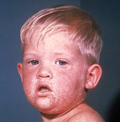
Parents have been queuing outside hospitals to have their children vaccinated and a 25-year-old man who had measles has died.
The epidemic is a blow to UK health authorities who recently reported that measles vaccination rates in young children had reached a 14-year high.
Experts say too few children aged 10 to 17 have had the MMR vaccine which protects against measles, mumps and rubella. Many of today’s adolescents were not vaccinated in the late 1990s when an unfounded vaccine scare sparked a dramatic falloff in immunisation rates in the UK.
Health authorities have opened drop-in clinics in several towns and villages across Wales in an effort to vaccinate children and teenagers and have also visited four schools believed to be at the centre of the outbreak.
The epidemic is unlikely to peak for another three weeks, according to Public Health Wales (PHW). Dr Marion Lyons, head of the vaccination programme for PHW, told BBC Wales Radio that public health officials are concerned that around 6,000 children in the Swansea area have still not had the MMR vaccine.
“We remain extremely concerned this outbreak is showing no signs of going away,” she said.
A European problem
The epidemic in Wales comes as health authorities in Europe had begun to hope that a series of outbreaks in France, Romania and elsewhere had abated.
The European Centre for Disease Prevention and Control (ECDC) said last month that measles cases in Europe had returned to ‘pre-outbreak levels’, although it warned that progress will have to continue across the continent if the 2015 measles elimination target is to be reached.
Europe has seen more than 90,000 cases of measles over the past three years, while there have been 20,000 rubella cases in 2012 alone. Over 50% of the measles cases were reported in adolescents or young adults, according to the World Health Organisation.
“The only way to halt these outbreaks and prevent future outbreaks is to make sure people are up-to-date with their immunisations, including the measles vaccine,” WHO Europe said.
European Immunization Week runs from April 22 to April 29.



